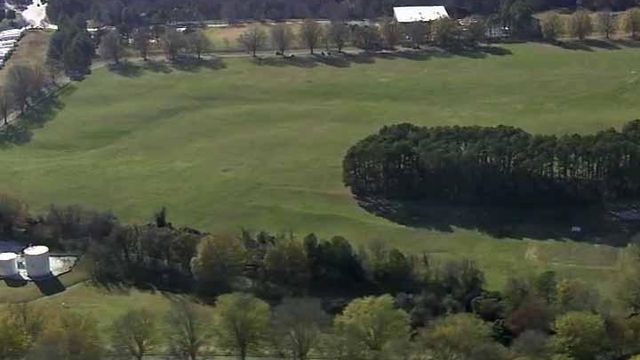Governor, Raleigh mayor sign Dix agreement
Gov. Pat McCrory's administration and Raleigh officials have reached a deal to sell the 308-acre Dorothea Dix property to the city, which hopes it will become a "destination park" for the region.
Posted — Updated"It’s a very fair deal. We’re both very happy with the way it came out," Raleigh Mayor Nancy McFarlane said. "We probably wish we’d paid less, (and) they would be happy if they were getting more, which probably means it’s the right number."
The city will pay $52 million for the site and has until Dec. 31 to identify a way to finance the purchase. In the past, city officials have said they may ask voters to approve a bond.
McCrory said the proceeds from the sale would be used to improve mental health treatment statewide. The Dorothea Dix site housed North Carolina's first psychiatric hospital.
The Raleigh City Council unanimously agreed to the framework of the deal Monday morning. It still must be approved by the Council of State, a group of 10 statewide elected officials that includes McCrory.
"This is a good proposal for both the city of Raleigh and also the state," McCrory said. "It's a much better proposal than the previous one."
The sale agreement replaces a lease that then-Gov. Bev Perdue and McFarlane agreed to in December 2012, just before Perdue left office. That deal came under immediate fire from the Republican-controlled legislature, which said the state was not getting enough in exchange for the property.
While lawmakers threatened in 2013 to scuttle the deal, Raleigh and McCrory administration officials instead put it on hold as they sought a new arrangement.
Negotiations began in earnest last March and were sometimes contentious, with city and state leaders initially divided on price, the cost of environmental cleanup and whether the state would retain any of the property.
"If you’ve ever purchased a house, you know how complicated and how many details there are going into it. Multiply that by 1,200," McFarlane said. "There’s a lot of property, a lot of pieces to it and a lot of buildings. It just took a very long time."
"I'm very proud of the process that we went through to get this agreement," McCrory said.
Lawmakers on hand Monday said the new deal was much better than the lease agreement, which they feared could end up costing the state money in the long run.
"The last one was a midnight deal that didn’t even follow the correct process," said Rep. Paul "Skip" Stam, R-Wake. "They've got the price to where it's realistic."
Both Stam and Rep. Nelson Dollar, R-Wake, said they believe lawmakers would not interfere with the deal. It does not need legislative approval, but the General Assembly could step in if it's unhappy with the terms.
Deal covers DHHS offices, environmental issues
An offer sheet summarizing the deal states that Raleigh will purchase the full 308-acre tract. At various points during the negotiations, the state had sought to retain a large chunk of the property to use as its permanent headquarters for the Department of Health and Human Services.
DHHS currently occupies dozens of aging buildings scattered across the property.
"One of our biggest issues, frankly, with that piece of property is the cost of maintaining those buildings," McCrory said, noting moving DHHS to new offices could cut the agency's operating costs.
The term sheet allows the state to lease back a 90-acre tract for up to 10 years at $1 per year. The state also will be able to lease two other tracts totaling 27.5 acres for up to 25 years.
Those lease-back arrangements will give the department time to find a new home for DHHS.
"We're going to do this the right way because I've got a very, very important employee base on that piece of property," McCrory said. "Before we move any of them, we've got to make sure we've got a smooth transition in place."
It's unclear where DHHS may end up.
"There's plenty of state-owned land in Wake County that we could use," Stam said.
Other officials say the state has looked in Research Triangle Park, although they deny any specific property is the current front runner. When asked about possible locations, both Stam and McCrory point out that the lease-back arrangements give the state time to find a new home for DHHS.
Another key feature of the deal settles the environmental liability for the property, which had a sticking point in negotiations. The city will assume liability for most of the property, but only after the state certifies it has been cleaned to acceptable standards for recreational use.
The one exception is the city will not take on liability related to the now-closed Raleigh Landfill site. Also, the city and the state have agreed to work together to clean up the site of a former power plant, which has been one of the most troublesome parts of the property.
The state also has agreed to give the city a 7.3-acre easement across the campus of the Gov. Morehead School for the Blind on Western Boulevard. That greenway will connect the new Dix park and the city's existing Pullen Park.
McFarlane said the development of the new park "will be a community endeavor," noting the Dix Visionaries group that has pushed for the deal for years has already secured $3 million to help in the design and planning phases.
"It's really all about the next generation," the mayor said, pointing to her granddaughter in the audience.
Gregory Poole Jr., a Raleigh businessman who has headed the Dix Visionaries effort, said he's glad the effort supporters have put in for several years has finally paid off.
"It’s going to be our Central Park," Poole said. "We’re ready, they’re ready and the state is ready."
Dix part of larger redevelopment
McCrory said his administration also is working on plans to revamp other state property in downtown Raleigh "to make it a showcase" that will attract tourists.
"This is just the first of many steps," he said. "As the health of the city of Raleigh is exhibited, it shows the health of the rest of the state."
The governor said he hopes to extend the Main Street-style feel along Fayetteville Street north through the government complex to attract more people to that area of downtown on afternoons and evenings.
Lawmakers have already approved plans to gut and redesign the Albemarle Building on Salisbury Street, which McCrory called "an embarrassment to taxpayers." He said his administration also is targeting other state buildings that are underutilized, too costly and badly designed.
"I don't want it to be a dead end at the Legislative Building," he said, noting improvements would benefit both Raleigh and state taxpayers.
McFarlane said Raleigh's downtown has several distinct areas, from the warehouse district on the west side to Moore Square to the east, and adding Dix Park and the development that will likely follow nearby only adds another segment to downtown.
"The goal is to really have all of the areas connected, to make it feel like it's all one incredibly vibrant city," she said.
Related Topics
• Credits
Copyright 2024 by Capitol Broadcasting Company. All rights reserved. This material may not be published, broadcast, rewritten or redistributed.






